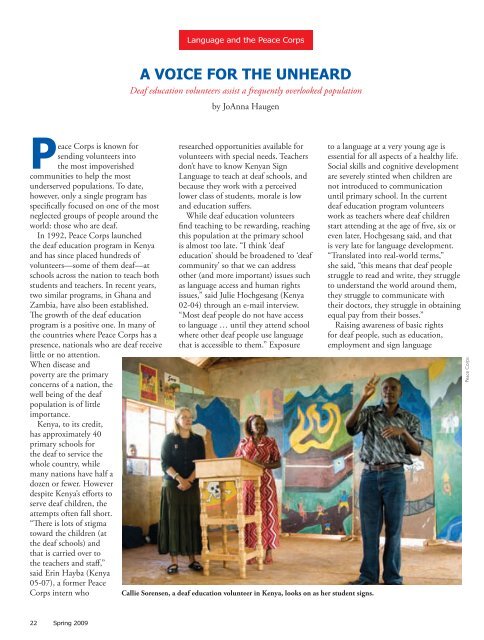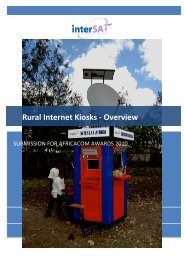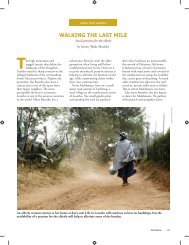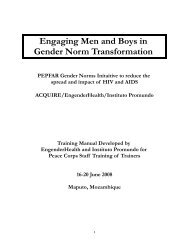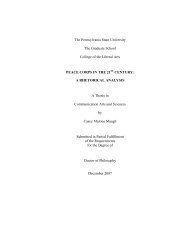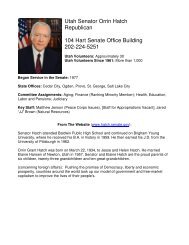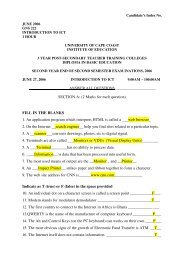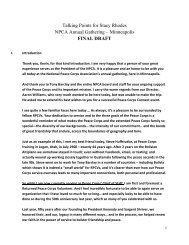special issue: inauguration 2009 - National Peace Corps Association
special issue: inauguration 2009 - National Peace Corps Association
special issue: inauguration 2009 - National Peace Corps Association
Create successful ePaper yourself
Turn your PDF publications into a flip-book with our unique Google optimized e-Paper software.
Language and the <strong>Peace</strong> <strong>Corps</strong><br />
A VOICE FOR THE UNHEARD<br />
Deaf education volunteers assist a frequently overlooked population<br />
by JoAnna Haugen<br />
<strong>Peace</strong> <strong>Corps</strong> is known for<br />
sending volunteers into<br />
the most impoverished<br />
communities to help the most<br />
underserved populations. To date,<br />
however, only a single program has<br />
specifically focused on one of the most<br />
neglected groups of people around the<br />
world: those who are deaf.<br />
In 1992, <strong>Peace</strong> <strong>Corps</strong> launched<br />
the deaf education program in Kenya<br />
and has since placed hundreds of<br />
volunteers—some of them deaf—at<br />
schools across the nation to teach both<br />
students and teachers. In recent years,<br />
two similar programs, in Ghana and<br />
Zambia, have also been established.<br />
The growth of the deaf education<br />
program is a positive one. In many of<br />
the countries where <strong>Peace</strong> <strong>Corps</strong> has a<br />
presence, nationals who are deaf receive<br />
little or no attention.<br />
When disease and<br />
poverty are the primary<br />
concerns of a nation, the<br />
well being of the deaf<br />
population is of little<br />
importance.<br />
Kenya, to its credit,<br />
has approximately 40<br />
primary schools for<br />
the deaf to service the<br />
whole country, while<br />
many nations have half a<br />
dozen or fewer. However<br />
despite Kenya’s efforts to<br />
serve deaf children, the<br />
attempts often fall short.<br />
“There is lots of stigma<br />
toward the children (at<br />
the deaf schools) and<br />
that is carried over to<br />
the teachers and staff,”<br />
said Erin Hayba (Kenya<br />
05-07), a former <strong>Peace</strong><br />
<strong>Corps</strong> intern who<br />
researched opportunities available for<br />
volunteers with <strong>special</strong> needs. Teachers<br />
don’t have to know Kenyan Sign<br />
Language to teach at deaf schools, and<br />
because they work with a perceived<br />
lower class of students, morale is low<br />
and education suffers.<br />
While deaf education volunteers<br />
find teaching to be rewarding, reaching<br />
this population at the primary school<br />
is almost too late. “I think ‘deaf<br />
education’ should be broadened to ‘deaf<br />
community’ so that we can address<br />
other (and more important) <strong>issue</strong>s such<br />
as language access and human rights<br />
<strong>issue</strong>s,” said Julie Hochgesang (Kenya<br />
02-04) through an e-mail interview.<br />
“Most deaf people do not have access<br />
to language … until they attend school<br />
where other deaf people use language<br />
that is accessible to them.” Exposure<br />
Callie Sorensen, a deaf education volunteer in Kenya, looks on as her student signs.<br />
to a language at a very young age is<br />
essential for all aspects of a healthy life.<br />
Social skills and cognitive development<br />
are severely stinted when children are<br />
not introduced to communication<br />
until primary school. In the current<br />
deaf education program volunteers<br />
work as teachers where deaf children<br />
start attending at the age of five, six or<br />
even later, Hochgesang said, and that<br />
is very late for language development.<br />
“Translated into real-world terms,”<br />
she said, “this means that deaf people<br />
struggle to read and write, they struggle<br />
to understand the world around them,<br />
they struggle to communicate with<br />
their doctors, they struggle in obtaining<br />
equal pay from their bosses.”<br />
Raising awareness of basic rights<br />
for deaf people, such as education,<br />
employment and sign language<br />
<strong>Peace</strong> <strong>Corps</strong><br />
22 Spring <strong>2009</strong>


